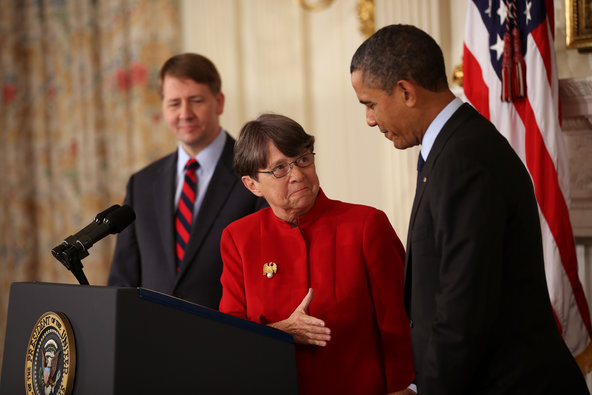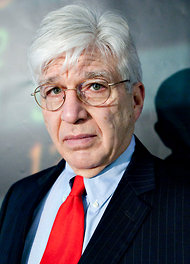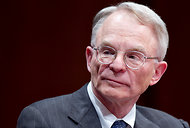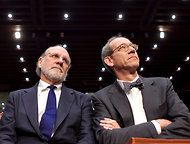 Doug Mills/The New York TimesPresident Obama with Mary Jo White and Richard Cordray.
Doug Mills/The New York TimesPresident Obama with Mary Jo White and Richard Cordray.
3:30 p.m. | Updated
President Obama announced Thursday his nomination of Mary Jo White, a former federal prosecutor turned white-collar defense lawyer, to be the next chairwoman of the Securities and Exchange Commission.
In a short ceremony at the White House, Mr. Obama also said he was renominating Richard Cordray as director of the Consumer Financial Protection Bureau, a post Mr. Cordray has held under a temporary recess appointment without Senate approval for the past year. The president portrayed both selections as a way of preventing a financial crash like the one he inherited four years ago.
“It’s not enough to change the law,” Mr. Obama said. “We also need cops on the beat to enforce the law.”
Mr. Obama noted that Ms. White was a childhood fan of “The Hardy Boys,” just as he was. He added that as the United States attorney in New York in the 1990s she “built a career the Hardy Boys could only dream of.”
He noted that she prosecuted money launderers, mobsters and terrorists. “I’d say that’s a pretty good run,” he said. “You don’t want to mess with Mary Jo. As one former S.E.C. chairman said, Mary Jo does not intimidate easily.”
Mr. Obama likewise pressed the Senate to finally confirm Mr. Cordray to the leadership of the consumer agency created by the Wall Street regulation law passed in 2010. The president installed Mr. Cordray as director last January without Senate approval using his recess appointment power, but his term will expire at the end of the year unless he wins approval from the upper chamber of Congress.
“Financial institutions have plenty of lobbyists looking out for their interests,” Mr. Obama said. “The American people need Richard to keep standing up for them. And there’s absolutely no excuse for the Senate to wait any longer to confirm him.”
Ms. White and Mr. Cordray spoke only briefly. Ms. White said if confirmed she would work “to protect investors and to ensure the strength, efficiency and the transparency of our capital markets.” Mr. Cordray said that during his short tenure he has “been focused on making consumer finance markets work better for the American people” and approached it “with open minds, open ears and great determination.”
Regulatory chiefs are often market experts or academics. But Ms. White spent nearly a decade as the United States attorney in New York, the first woman named to this post. Among her prominent cases, she oversaw the prosecution of the mafia boss John Gotti as well as the people responsible for the 1993 World Trade Center bombing. She is now working the other side, defending Wall Street firms and executives as a partner at Debevoise Plimpton.
As the attorney general of Ohio, Mr. Cordray made a name for himself suing Wall Street companies in the wake of the financial crisis. He undertook a series of prominent lawsuits against big names in the finance world, including Bank of America and the American International Group.
The White House expects Ms. White, 65, and Mr. Cordray, 53, to draw on their prosecutorial backgrounds while carrying out a broad regulatory agenda under the Dodd-Frank Act. Congress enacted the law, which mandates a regulatory overhaul, in response to the 2008 financial crisis.
Jay Carney, the White House press secretary, said Ms. White has “an incredibly impressive resume” and that her appointment along with the renomination of Mr. Cordray sends an important signal.
“The president believes that appointment and the renomination he’s making today demonstrate the commitment he has to carrying out Wall Street reform, making sure we have the rules of the road that are necessary and that are being enforced in a way” to avoid a crisis like that of 2008, Mr. Carney said.
Another White House official added that Ms. White and Mr. Cordray will “serve in top enforcement roles” in part so that “Wall Street is held accountable and middle-class Americans never again are harmed by the abuses of a few.”
Ms. White will succeed Elisse B. Walter, a longtime S.E.C. official, who took over as chairwoman after Mary L. Schapiro stepped down as the agency’s leader in December. Mr. Cordray joined the consumer bureau in 2011 as its enforcement director.
The nominations could face a mixed reception in Congress. Republicans had previously vowed to block any candidate for the consumer bureau, leading to the recess appointment. It is unclear whether the White House and Mr. Cordray will face another standoff the second time around.
Mr. Carney argued that there were no substantive objections to Mr. Cordray’s confirmation, only political ones. “He is absolutely the right person for the job,” Mr. Carney said.
Ms. White is expected to receive broader support on Capitol Hill. Senator Charles E. Schumer, a New York Democrat, declared that Ms. White was a “tough-as-nails prosecutor” who “will not shy away from enforcing the laws to ensure that markets operate fairly.”
But she could face questions about her command of arcane financial minutiae. She was a director of the Nasdaq stock market, but has otherwise built her career on the law-and-order side of the securities industry.
People close to the S.E.C. note, however, that her husband, John W. White, is a veteran of the agency. From 2006 through 2008, he was head of the S.E.C.’s division of corporation finance, which oversees public companies’ disclosures and reporting.
Some Democrats also might question her path through the revolving door, in and out of government. While seen as a strong enforcer as a United States attorney, she went on in private practice to defend some of Wall Street’s biggest names, including Kenneth D. Lewis, a former head of Bank of America. She also represented JPMorgan Chase and the board of Morgan Stanley. Last year, the N.F.L. hired her to investigate allegations that the New Orleans Saints carried out a bounty system for hurting opponents.
Consumer advocates generally praised her appointment on Thursday. “Mary Jo White was a tough, smart, no-nonsense, broadly experienced and highly accomplished prosecutor,” said Dennis Kelleher, head of Better Markets, the nonprofit advocacy group. “She knew who the bad guys were, went after them and put them in prison when they broke the law.”
The appointment comes after the departure of Ms. Schapiro, who announced she would step down from the S.E.C. in late 2012. In a four-year tenure, she overhauled the agency after it was blamed for missing the warning signs of the crisis.
Since her exit, Washington and Wall Street have been abuzz with speculation about the next S.E.C. chief. President Obama quickly named Ms. Walter, then a Democratic commissioner at the agency, but her appointment was seen as a short-term solution. It is unclear if she will shift back to the commissioner role if Ms. White is confirmed.
In the wake of Ms. Schapiro’s exit, several other contenders surfaced, including Sallie L. Krawcheck, a longtime Wall Street executive. Richard G. Ketchum, chairman and chief executive of the Financial Industry Regulatory Authority, Wall Street’s internal policing organization, was also briefly mentioned as a long-shot contender.
Kitty Bennett contributed reporting.
Article source: http://dealbook.nytimes.com/2013/01/24/mary-jo-white-to-be-named-new-s-e-c-boss/?partner=rss&emc=rss



